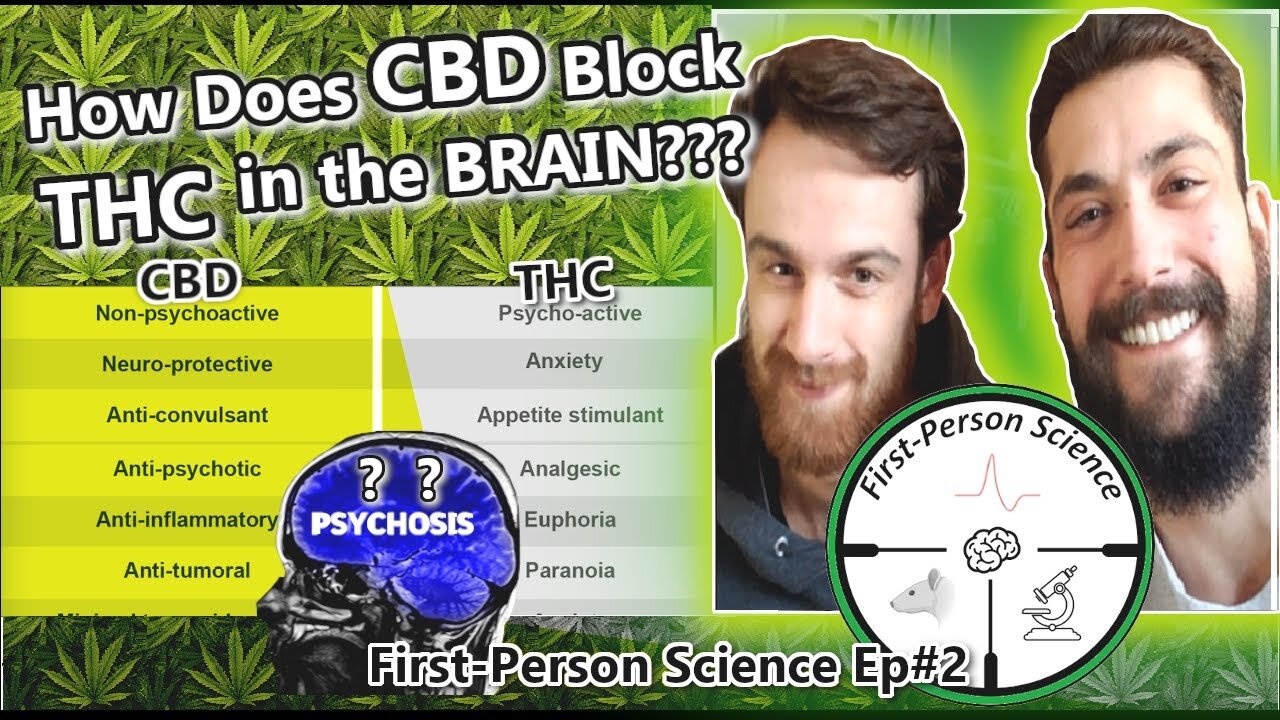Premium Only Content

How Does CBD Block Side Effects of THC? | Highs & Lows of Potent Cannabis Use. FPS #2
Evidence suggests that THC and CBD each act on specific receptors in the brain to cause different effects on Biomarkers, other neurotransmitter systems and molecular pathways. In fact, CBD can even prevent many of the side effects associated with potent cannabis (high THC cannabis) such as psychosis, paranoia, and in some cases can act as a treatment for those diagnosed with schizophrenia.
In this episode of First-Person Science, PhD Candidate & Vanier Scholar Roger Hudson speaks about his recently published manuscript in the Journal Of Neuroscience, discussing how THC causes adverse psychiatric side-effects in some users, and the science of how cannabidiol (CBD) can counteract these side effects.
"Cannabidiol (CBD) Counteracts the Psychotropic Side-Effects of Delta-9-Tetrahydrocannabinol (THC) in the Ventral Hippocampus through Bidirectional Control of ERK1–2 Phosphorylation", published in The Journal of Neuroscience [2019 Oct;39(44):8762–8777] / DOI:10.1523/JNEUROSCI.0708-19.2019.
https://www.ncbi.nlm.nih.gov/pubmed/31570536
_________________________________________________________________________________
Use Filmora To Create Great Quality Videos - 20% off Link: http://tiny.cc/b86pkz
ABSTRACT: Evidence suggests that the phytocannabinoids Delta-9-tetrahydrocannabinol (THC) and cannabidiol (CBD) differentially regulate salience attribution and psychiatric risk. The ventral hippocampus (vHipp) relays emotional salience via control of dopamine (DA) neuronal activity states, which are dysregulated in psychosis and schizophrenia. Using in vivo electrophysiology in male Sprague Dawley rats, we demonstrate that intra-vHipp THCstrongly increases ventral tegmental area (VTA)DAneuronal frequency and bursting rates, decreases GABA frequency, and amplifies VTA beta, gamma and epsilon oscillatory magnitudes via modulation of local extracellular signal-regulated kinase phosphorylation (pERK1–2). Remarkably, whereas intra-vHipp THC also potentiates salience attribution in morphine place-preference and fear conditioning assays, CBD coadministration reverses these changes by downregulating pERK1–2 signaling, as pharmacological reactivation of pERK1–2 blocked the inhibitory properties of CBD. These results identify vHipp pERK1–2 signaling as a critical neural nexus point mediating THC-induced affective disturbances and suggest a potential mechanism by which CBD may counteract the psychotomimetic and psychotropic side effects of THC.
Keywords: cannabidiol; delta-9-tetrahydrocannabinol; dopamine; extracellular signal-regulated kinase; ventral hippocampus; ventral tegmental area.
___________________________________________________________________________________
Interested in cutting-edge neuroscience research? Or cutting through the ribbons of public- accessibility for research articles?
Introducing First-Person Science: the first and only podcast dedicated to in-depth exploration of neuroscience research articles with first-hand perspectives and narratives from the authors themselves.
First-Person Science introduces a new way of discovering and engaging with neuroscience-based research, and breaks down barriers to science communication that will encourage collaboration and discussion between scientists and the public, alike.
The podcast aims to be relevant to neuroscience experts and the public, alike - to serve a role similar to an audio-book, but for journal articles, and with a much-enhanced experience. We aim to explain jargon and complicated concepts in a brief/succinct way so that first-time listeners can easily understand, while simultaneously not boring those that are experts in the field.
Listen to our podcast on itunes, spotify, or wherever you get your podcasts.
Direct audio download link: https://firstpersonscience.podbean.com/
Follow us on Twitter to stay up to date on the latest research: @firstpersonsci
Interested in increasing exposure for your published research? Curious about becoming involved with the show? Email us: firstpersonsciencepod@gmail.com.
Produced by Roger Hudson, PhDc
-
 6:00:08
6:00:08
SpartakusLIVE
8 hours agoYoung Spartan STUD teams with old gamers for ultimate BANTER with a SMATTERING of TOXICITY
23.9K -
 1:50:39
1:50:39
Kim Iversen
9 hours agoShocking Proposal: Elon Musk for Speaker of the House?! | IDF Soldiers Reveal Atrocities—'Everyone Is a Terrorist'
69.3K162 -
 43:27
43:27
barstoolsports
12 hours agoOld Dog Bites Back | Surviving Barstool S4 Ep. 9
125K3 -
 5:13:04
5:13:04
Right Side Broadcasting Network
7 days agoLIVE REPLAY: TPUSA's America Fest Conference: Day One - 12/19/24
178K27 -
 1:06:01
1:06:01
Man in America
1 day agoPfizer Has Been Caught RED HANDED w/ Dr. Chris Flowers
56.9K15 -
 2:24:15
2:24:15
Slightly Offensive
10 hours ago $17.12 earnedAttempted ASSASSINATION of Nick J Fuentes LEAVES 1 DEAD! | Guest: Mel K & Breanna Morello
47.4K28 -
 1:43:08
1:43:08
Roseanne Barr
10 hours ago $27.56 earned"Ain't Nobody Good" with Jesse Lee Peterson | The Roseanne Barr Podcast #79
81.8K49 -

The StoneZONE with Roger Stone
7 hours agoTrump Should Sue Billionaire Governor JB Pritzker for Calling Him a Rapist | The StoneZONE
51.6K5 -
 1:36:58
1:36:58
Flyover Conservatives
1 day agoAmerica’s Psychiatrist Speaks Out: Are We Greenlighting Violence? - Dr. Carole Lieberman | FOC Show
34.9K6 -
 6:44:54
6:44:54
LittleSaltyBear
9 hours ago $3.13 earnedNecromancing Path of Exile 2 4K
30.5K4